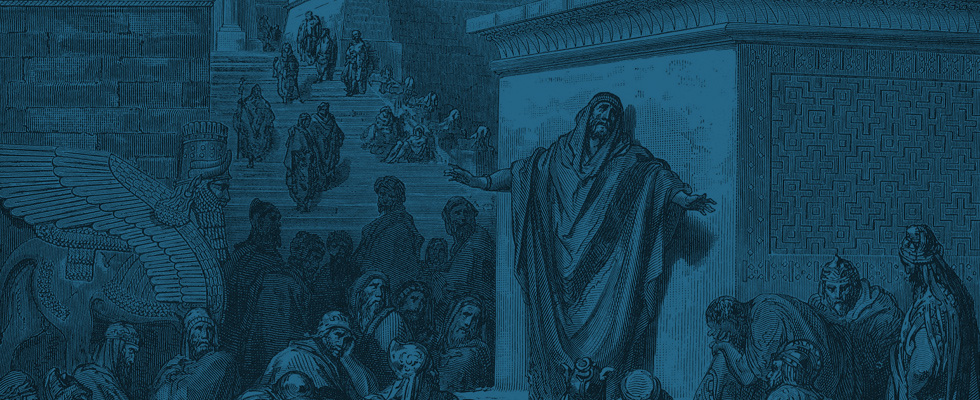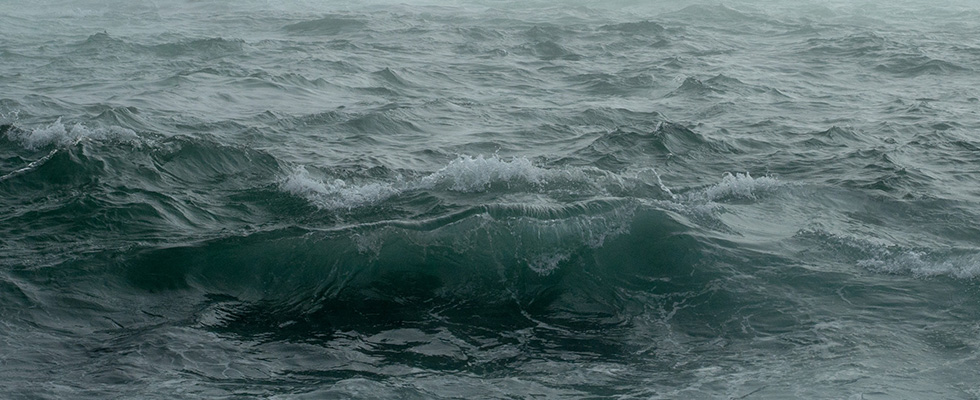Jonah had been given the onerous task of going to Nineveh to preach against its sins. Instead, he had taken off in the opposite direction, not because he was a coward but because he feared that God would forgive the Ninevites. He wanted God to do to Nineveh what He had done to Sodom and Gomorrah. Before God dealt with Nineveh, He had to deal with His backsliding servant, Jonah. Because God loves His people, He chastens them (Heb.12:5-6). God closes in on Jonah.
God chastens the backslider
The Lord sent a great storm which threatened the ship. So afraid were the pagan sailors that each one cried out to his god while throwing cargo into the sea. Meanwhile, Jonah snored on in the inner part of the ship (1:4-5). No doubt, he felt a kind of peace, but it was not the peace of God. Before C. S. Lewis became a Christian, he was an atheist, and when he became a Christian, he said that to speak of his search for God was like speaking of a mouse’s search for a cat. The same could be said of backsliding Jonah.
Yet God works all things, not just the good things (Eph.1:11). We will see this in Jonah 1 in four ways:
(a) God sent a great storm (1:4). Jonah takes a cruise and runs into a dreadful storm. Was it bad luck? Of course not – it is God who commands the winds and the waves (Ps.107:25).
(b) God controlled the casting of lots. Jonah was woken up and told to call on his god (1:5-6). The attitude of the sailors was: ‘Call on your god, any god, we may hit the right one and be spared all this.’ Finally, the sailors decide to cast lots, and guess who won the lottery? Jonah! There are no flukes in God’s kingdom (Prov.16:33).
(c) God stilled the storm when His purposes were accomplished (1:15).
(d) God sent a great fish, not necessarily a whale, to swallow Jonah (1:17). A Cachelot (sperm) whale eats squid and octopus, so it could swallow a man whole, but the point is that this is a miracle. God has prepared a great fish.
These providences are obvious. There is no such thing as luck. Things do not just happen. Our doctrine of providence tends to be astray – if lightning just misses us, we think that was providence, but if it hits fifty miles away, that is just nature.
Francis Thompson’s best-known poem is The Hound of Heaven where he describes his flight from God:
I fled Him down the nights and down the days;
I fled Him down the arches of the years;
I fled Him down the labyrinthine ways
of my own mind; and in the midst of tears
I hid from Him …
But God pursued him. And God pursued Jonah. God chastens His people. He sends them an illness so that they have time to reflect on their lives; or He sends an ‘accident’; or a failure at school or work. Not all things that go wrong in a Christian’s life are a result of chastening. God simply tested Job, for example. Sometimes God may simply want to remind us that this is not our home. But if you are a Christian, some of the suffering you go through is due to God’s chastening:
Trials make the promise sweet;
Trials give new life to prayer;
Trials bring me to His feet,
Lay me low, and keep me there.
When we are rebellious like Jonah, it may take a good shake for us to get back on track. The television may blow up, and God confronts us.
God rebukes the backslider
We have seen that God chastens through circumstances, but He also chastens verbally, and not necessarily by a preacher in church. Jonah was not in a church here. Instead, a pagan captain rebuked him (1:5-6). It is the old saying: ‘There are no atheists in fox-holes’. All the pagans were calling out to false gods, and the one man who knew the true God is asleep in the ship. The rebuke from the pagan captain must have had some effect on Jonah.
When the lot falls on Jonah, the sailors question him (1:8). Jonah is flushed out into the open, and confesses that he is a Hebrew who fears the creator of heaven and earth (1:9). Verse 10 says that the sailors were, literally, ‘afraid with fear’ (the NIV says ‘terrified’). They were shocked at what Jonah was doing, not that he was disobeying the true God, but that he was disobeying his god. These men are not beasts; they have a sense of right and wrong (Rom.2:14-16). The people who do not know the true God are shocked at the irreligion of the man who does know the true God. That should sound uncomfortably familiar. These men want to do what is right. They do their best to save Jonah’s life, and rowed hard (1:13). In the sporting cliché, they dug deep.
God seeks to reclaim His rebellious people. God sent Nathan the prophet to David (see 2 Sam.12:1-7a). But no prophet comes to Jonah. Instead, pagan sailors are used to rebuke him. It may happen to you. You may be immune to the preacher, but one day one of your pagan friends who would not know where John was in the Bible, says: ‘Hey, I thought that you were a Christian.’ And it is that which strikes home; it is then that you face up to the fact that something is wrong. It hurts to be chastised by a pagan. But God can do that; God does do that.
The backslider confesses
Jonah had not confessed his faith in God for a while. But here he was, confessing that he worshipped the God of the Hebrews, Yahweh, the eternal I am, the creator of all the world and the Lord of Israel (1:9). When Neil Armstrong and Edwin Aldrin landed on the moon in July 1969, they read from Genesis 1. The true God is the creator of the universe. Then Jonah told the pagan sailors that he had been running away from this God (1:10). This is like Joseph’s brothers in the prison in Egypt (Gen.42:21). Jonah does not even ask for mercy. He wanted none for Nineveh and he expected none for himself (1:12). He bows his head to accept his punishment. He was not counting on the mercy and favour of God. All this had a great effect on the pagan sailors who feared the Lord and offered a sacrifice to Him and made vows (1:16). Calvin is hesitant about accepting this as true faith but it certainly looks like it.
The lesson is this. In Psalm 32:7 David says of God: ‘You are my hiding place.’ There is no hiding place from God; rather, God Himself is our hiding place.




















